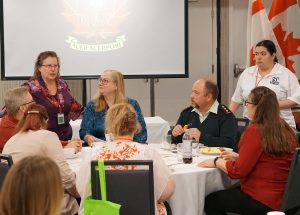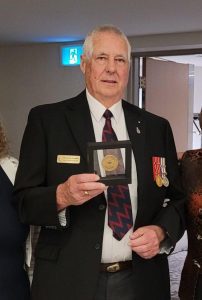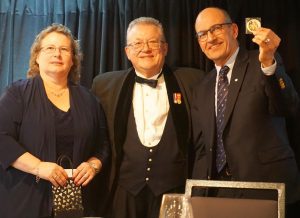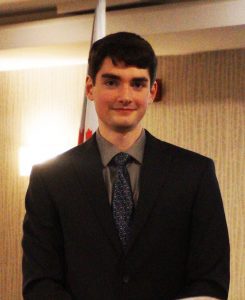
When I arrived at the meeting, the executive director of the group was at the lectern addressing members. Rob Gill had finished his introductory remarks to the Army Cadet League’s annual general meeting, including a few jokes to break the ice.
Then he got to the theme of the weekend conference, “Community Engagement,” and wisely he chose to focus on the organization’s people. Among them, he complimented the outgoing president.
“Rick Brown doesn’t say an awful lot,” Gill said. “But he’s one of the best listeners I’ve ever known.”
I’d arrived early at the AGM, principally to check out the venue where later that night I was to deliver a keynote address. After meeting Paul Preikschas, ACLC executive director, I did a bit of reconnoitering to learn more about my intended audience and the theme of the conference.
The Army Cadet League of Canada began in 1971, as a non-profit, civilian organization working with the Department of National Defence supporting young Canadians wishing to take part-time army training. ACLC has a staff of three and a board of 15, but its day-to-day activity depends largely on 1,500 Ontario volunteers.

And I met with many of them that day, and learned that past-president Brown’s listening skills had helped keep the ACLC functioning through the dark days of the pandemic and sparked a sizable recruitment of young women into its ranks.
Before leading the ACLC, Brown (from the Kawartha Lakes area) served for 35 years with various Ontario regional police forces and the Ontario Provincial Police. “President Brown’s leadership has been a model for all of us,” Gill said.
During the dinner that evening I sat with incoming president Charlene Orrell. She admitted to me that she’d paid little attention to army matters until her son expressed interest in becoming a cadet. Many volunteer hours followed to the point that she’s now committed herself to three years as ACLC president, all while continuing a full-time job from her home in eastern Ontario.
“It’s a bit daunting,” she said, “but this group of volunteers keeps us all motivated.”

Many years ago, when I first set out as a freelance writer and broadcaster in western Canada, I worked for a while with an outreach group at the University of Saskatchewan. Among its mandates was to discover how communities away from the big cities manage to survive, indeed thrive.
We travelled for several weeks to prairie towns in eastern Saskatchewan; this was at a time when transportation giants such as CN and CP were tearing up railway lines and dismantling grain elevators. I interviewed farmers, merchants, teachers, municipal politicians, homemakers, women and men young and old.
In a nutshell they all said if a town could keep its farm implement dealership, a place of worship and a sporting venue all open and functioning, it could survive. “But,” almost all added, “none of these community pillars can survive without volunteers.”
During my daylong visit to the ACLC weekend conference in Markham, I also met Stewart Sherriff, a retired captain from the storied Ontario regiment, the Lorne Scots. Among his volunteer activities, he’s helped secure battle honours recognition for the regiment (soldiers with the Lorne Scots served in the War of 1812, the Great War, the Second World War and the war in Afghanistan).
He also helped convince the City of Brampton to lease its 170-year-old downtown firehall as new home of the Lorne Scots Regimental Museum. “Our grand opening is coming up on May 11,” he told me. “It’s another example of army cadet league volunteer work … helping to ensure young people learn about our military past.”

I guess I’m giving away trade secrets here, but after many years of public speaking I’ve learned how important it is to study and know your audience before you speak to it. I’d spent part of the day picking up clues about how the ACLC functions.
Then, I met one the league’s youth beneficiaries. Warrant Officer Ethan Russell, recent recipient of the ACLC’s Colonel/Commandant National President Scholarship for his post-secondary school studies; Russell was recognized for outstanding “commitment, perseverance and positivity.” I picked up on some of those themes as I began my presentation.
“Community means a lot of different things,” I said. “Geography, business, neighbourhoood, social and spiritual connection. But if anyone were looking for the essence of what makes society function, I’d say it’s an expression of service … and recognizing young citizens like Ethan Russell.”
The concept of military service has always emphasized what happens at the front line. I suggested to the banquet audience that their behind-the-scenes activity was the service that too often goes unnoticed. Like so much else, true volunteer spirit is the positive work that people do when no one is watching.